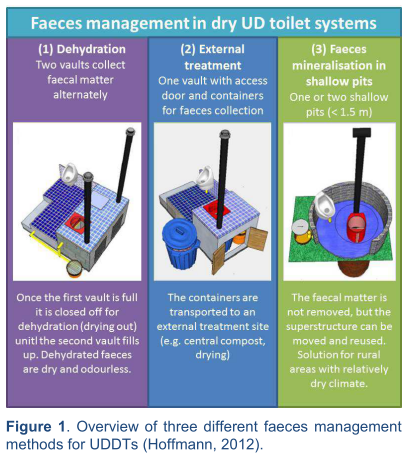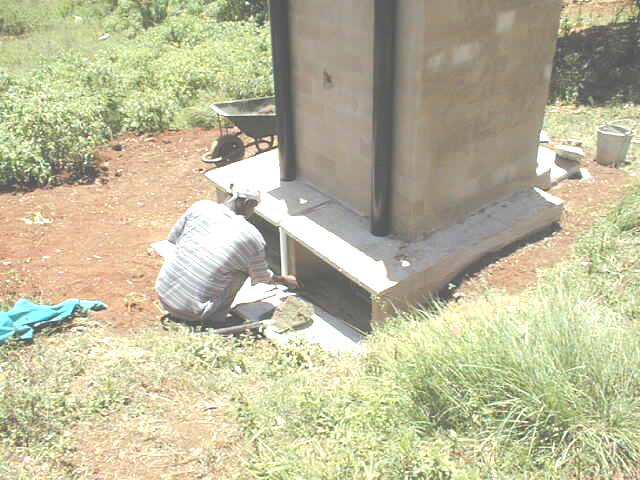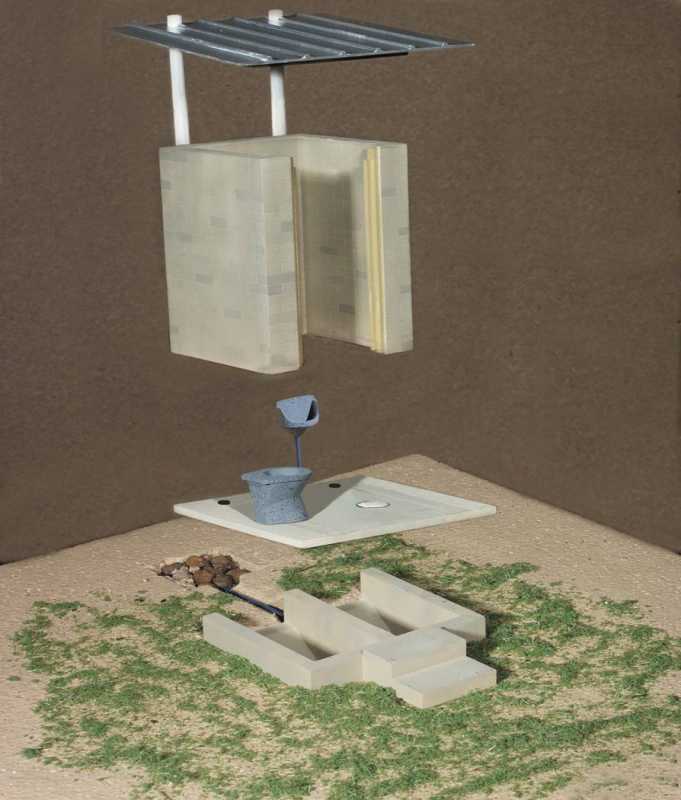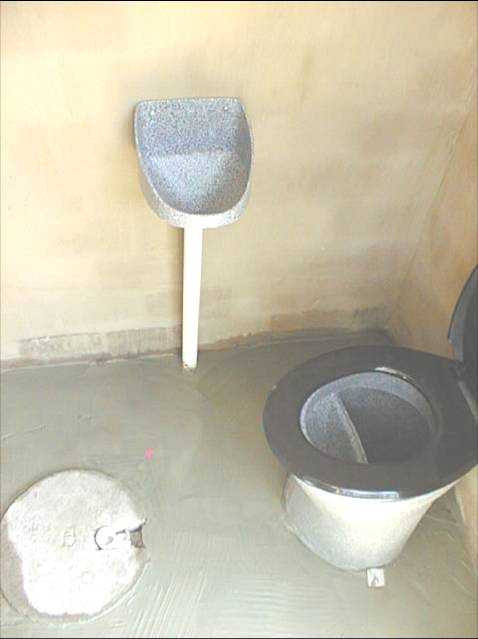- Sanitation systems
- Toilets with urine diversion
- UDDTs (urine-diverting dry toilets)
- when is a UDDT a bucket? (and eThekwini, Durban case)
when is a UDDT a bucket? (and eThekwini, Durban case)
36.2k views
and defines very clearly between them.
In Peru we call the UD VIP ...ECOLET (just to confuse a bit more
I remember that there was another name as well used in Africa.
Yours
Christoph
Attachments:
-
 uddtIMG_04...4649.png
(Filesize: 203KB)
uddtIMG_04...4649.png
(Filesize: 203KB)
Please Log in to join the conversation.
You need to login to replymuench wrote: Perhaps the eThekwini colleagues didn't like UDDTs at first and wanted to coin their "own" name for the same thing?
Well, we also have to see that the term "UDDT" is around for just a few years, and that discussions of names and definitions have a long tradition in the ecosan-movement. Ah sorry, it's called susan now !
I am not sure exactly when UDDT was started being used. In 2006, when at gtz we wrote the predecesssor to the UDDT technology review, we still called it "dehydration toilets". At that time, that was an attempt to be more specfic than the commonly used terms composting toilet, double vault composting latrines, ecosan toilets etc...
I think it would be a good thing, if the "standard definitions" put down in the Compendium are increasingly being used by everyone. But as the whole topic is so dynamic (e.g. think TPS), not sure if that is achievable.
VIP, btw. is age-old (70s) and worldwide understood, compared with all those newer things...
Please Log in to join the conversation.
You need to login to reply- Elisabeth
-
- User is blocked
- Freelance consultant since 2012
Less- Posts: 3372
- Karma: 54
- Likes received: 932
Re: when is a UDDT a bucket?
You wrote:
The Durban design should be described as an alternating twin pit UDDT becuase two vaults are used, though not in parallel.
But why do you call it a pit? It is fully lined and is really a vault, with nothing seeping out, or am I wrong?
Thus: "alternating twin vault UDDT" if anything? Which is also often called a "double vault UDDT" and we are back to the normal term.
I am against the term "pit" if it is not a pit... A pit is designed to achieve leaching of liquids.
Perhaps the eThekwini colleagues didn't like UDDTs at first and wanted to coin their "own" name for the same thing?
Elisabeth
Freelance consultant on environmental and climate projects
Please Log in to join the conversation.
You need to login to replyI am not sure what is meant by this hybrid version "Alternative Twin Pit Urine Diversion VIP" metionned in the report you linked, Joe. The report does not talk about it. The guys in Durban developed and tested a lot of things, possible that they experimented with a Urine diversion VIP, but I don't think it got into wider use there...
But confusing, yes.
Please Log in to join the conversation.
You need to login to reply- joeturner
-
 Topic AuthorLess
Topic AuthorLess- Posts: 717
- Karma: 23
- Likes received: 185
Dave
Attachments:
-
 DurbanUD4.jpg
(Filesize: 51KB)
DurbanUD4.jpg
(Filesize: 51KB)
-
 DurbanUD1.jpg
(Filesize: 44KB)
DurbanUD1.jpg
(Filesize: 44KB)
-
 DurbanUD3.jpg
(Filesize: 23KB)
DurbanUD3.jpg
(Filesize: 23KB)
Please Log in to join the conversation.
You need to login to reply- joeturner
-
 Topic AuthorLess
Topic AuthorLess- Posts: 717
- Karma: 23
- Likes received: 185
Urine Diversion sanitation can be viewed as a three-step process dealing with human excreta: containment, sanitisation and recycling. The objective is to protect human health and the environment while reducing
the use of water in sanitation systems and recycling nutrients to help reduce the need for artificial fertilizers in agriculture (Winblad et al., 2004). The process requires the separation of the urine and faeces at source. The solid faecal matter is collected in a vault where it dehydrates, wood ash or soil and ash is often added to assist in the dehydration and composting process (Morgan, 2005). These systems also come in the form of buckets and pit.
Amongst these, the eThekwini Metro in South Africa uses a hybrid version which is a cross between both dry systems and can be called the Alternative Twin Pit Urine Diversion VIP.
from this report by the SA Water Research Commission.
Am I allowed to admit to being properly confused now?
Please Log in to join the conversation.
You need to login to reply- joeturner
-
 Topic AuthorLess
Topic AuthorLess- Posts: 717
- Karma: 23
- Likes received: 185
Please Log in to join the conversation.
You need to login to reply- Elisabeth
-
- User is blocked
- Freelance consultant since 2012
Less- Posts: 3372
- Karma: 54
- Likes received: 932
Re: when is a UDDT a bucket?
(One could imagine a UD-VIP if someone adds a urine diversion to the pit latrine, and then e.g. inflitrates the urine separately. The faeces would still be in the pit though, which is not closed at the bottom or sides. In this context, you might find these photos from Burkina Faso from Florian Erzinger interesting:
www.flickr.com/photos/gtzecosan/sets/72157625009287082/
Set title: Burkina Faso - adaptation of pit latrine to urine diversion.)
Much more often people speak (confusingly) of "ecosan toilet" = UDDT = composting toilet...
And yes, in Durban they have VIPs and UDDTs in the same geographical region so maybe you got confused there, Joe?
Here is something that we wrote in the UDDT technology review (download the document here: www.susana.org/lang-en/library?view=ccbktypeitem&type=2&id=874) about different terms for UDDTs (I am happy to read your positive feedback about this document, Joe - made my day):
The term ‘urine-diverting’ is understood to be synonymous
with ‘urine diversion’ and ‘urine separation’. The ‘faeces
vault’ is alternatively referred to as a ‘faeces chamber’.
A variety of different names are currently used around the
world to denote UDDTs:
• The term ecosan toilet is often used for UDDTs, largely
because it provides a simple terminology for
communication at the grass-roots level. This term
implies that the user or community at large must reuse
their treated excreta in accordance with the broader
ecosan concept. However, we consider excreta reuse a
matter of user preference that is not necessarily
required for the sustainability of UDDTs. Furthermore,
the range of possible ecosan solutions is not limited to
UDDT technologies.
• In India and South America, UDDTs are often referred
to as composting latrines. The term is misleading,
however, as the treatment of faeces in UDDTs does not
include a substantial composting process.
• Some researchers in the USA use the phrase Double
vault urine diversion latrine (DVUD latrine) to describe
UDDTs with double dehydration vaults.
• The term Urine Diversion Toilet (UD-Toilet) is used in
the eThekwini Metropolitan Municipality in South Africa,
which is home to the world’s highest number of UDDTs.
• In Spanish, the UDDT is widely known as Bano
Ecológical Seco. The term Toilette sèche avec
séparation d’urine is used in French speaking countries.
• Urine diversion dehydration toilet is another term used
by many people but strictly speaking it should only be
used for double vault systems.
(the Akvo website which Joe mentioned is built on the Eawag compendium which Florian mentioned; both of these are very good and useful (perhaps slightly too academic on the split between "user interface" and "toilet, storage & treatment"))
Regards,
Elisabeth
Freelance consultant on environmental and climate projects
Please Log in to join the conversation.
You need to login to replyjoeturner wrote: (...) it is generally accepted that VIP and UDDT are independent and exclusive terms.
I think exactly this. I still guess that there's some confusion here, eg. in eThekwini they have both VIP and UDDT, but not that it's the same thing. However, perhaps I've missed something... so could you give me a link or doc about this "UDDT-VIP"?
Best, Florian
PS: the (in my opinion) best systematic overview of sanitation systems, very helpful to be clear about terms and definitions, is Eawag's sanitation compendium: www.eawag.ch/forschung/sandec/publikatio...ompendium_e/index_EN
Please Log in to join the conversation.
You need to login to reply- joeturner
-
 Topic AuthorLess
Topic AuthorLess- Posts: 717
- Karma: 23
- Likes received: 185
I totally understand that you're all using jargon, but I still don't think there is much commonality about how the terms are used. Many people say their VIPs are urine diversion dry toilets even if they do not fit the criteria for Urine Diversion Dry Toilets. eThekwini describe their toilets as VIPs. Are you saying that they cannot also be UDDTs?
I cannot see that it is generally accepted that VIP and UDDT are independent and exclusive terms.
Please Log in to join the conversation.
You need to login to replyof course it is a bit difficult to discuss about terminology, as terms are used in many different ways by different people, also there are a lot of different local names in use (as you rightly point out in another thread). Still for most technologies there is a generally more less agreed terminology in use among the international community. In particular, there are the terms defined by the Joint Monitoring Programme, that are used to qualify systems as "unimproved" or "improved" sanitation.
And there, a "bucket toilet" is a toilet that collects both feces and urine in a container and the stuff needs to be handled in its rather fresh state. A bucket toilet is generally considered as more problematic than a simple pit toilet (where the content does not necessarly need to be handled). Bucket toilet is in many places clearly considered as unimproved sanitation, and the JMP explictely does so. I definitely agree with Elisabeth that the term "bucket toilet" should not be used for UDDTs (even if there are buckets used inside the feces vault).
Another confusion of terms you used a couple of times is UDDT-VIP.
A VIP, Ventilated Improved Pit Latrine, is a Pit Latrine with some improvements (ventilation among others) so that it can be considered as improved sanitation (according to JMP definitions). Still it is a pit latrine, so clearly not a UDDT which always has some sort of constructed vault or container to collect and dry feces.
Best, Florian
Please Log in to join the conversation.
You need to login to reply- Sanitation systems
- Toilets with urine diversion
- UDDTs (urine-diverting dry toilets)
- when is a UDDT a bucket? (and eThekwini, Durban case)








